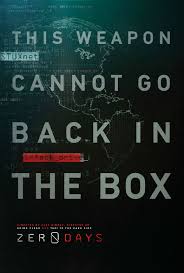
ZERO DAYS
US, 2016, 116 minutes, Colour.
Directed by Alex Gibney.
Alex Gibney is a master director of documentaries, winning an Oscar for his Taxi to the Darkside about prisons in Afghanistan. He has been quite prolific, subjects ranging from the men of Enron, to Wiki Leaks, to exposing Lance Armstrong, a film on Steve jobs, the exposé of Scientology, Going Clear.
The basic premise of this film is that in the past there have been tensions with nuclear war, chemical warfare, biological warfare – but now we are in an age of cyber warfare. Some of the talking heads here explain that negotiations for treaties on the previous kinds of warfare, for example Gorbachev and Reagan signing treaties in the 1980s, have taken decades but have achieved good results. What is the prospect now for treaties in terms of cyber warfare?
This documentary focuses on the release of the Stuxnet, a self-replicating Internet virus, used by the United States to infiltrate cylinders and other networks in Iran’s nuclear program. The origin was secret, commentators saying they were unable to answer questions, the origin of the virus eventually revealed to be the United States itself.
This documentary is far less outgoing than many of Alex Gibney’s previous documentaries. It is very much a talking film, quite a range of talking heads, practically all male. Where there is a female, it is someone who is talking to the media with the danger of her being arrested. She is presented in computer diagram although, at the end she is revealed as an actress reading the lines on behalf of the anonymous speaker.
The focus of the film is on a virus which most people will not have heard of, Stuxnet. It was effective in the first decade of the 21st century. One of the issues is the origin of the virus and the question of its attacks on you Iran and its nuclear plants. Visuals of the then President Ahmadinejad (and the photos and video material being studied by American experts to appreciate the developments in the Iranian projects), along with demonstrations against the Americans, statements about cyber warfare and the Americans from Iranian officials.
There follows many, many talking heads who state that they are unable to talk about the virus, that it is part of national security.
What emerges is that the United States government spent billions on the development of this virus in the presidency of George W. Bush – with clips of him and his advisers and decision makers. Also in the picture is Israel, with images of Benjamin Netanyahu, the extreme hostility of Israel towards Iran.
What the film makers have done is to interview people, consult articles and exposés, to draw the conclusion that the Americans were responsible for this virus. Commentators then explain that while it might have had a temporary effect on the delaying of the development of Iranian nuclear weaponry, the Iranians themselves developed many hackers with the capability, and some practice, of infecting US business and the businesses of allies like Saudi Arabia. The question then arises of how much value is there in this cyber warfare and has enough consideration been given to the consequences of its activity, for example the outages of power, the purifying of water and the subsequent deaths from this warfare.
This continues into the Obama administration, scenes of his taking the oath of office, his meetings in the security room, and the power of the legislation or the powers of the President in terms of this kind of waging of warfare.
The film requires some concentration, there is a lot of technical detail, computer screens on the screen. The film is not exactly fear-mongering but it has the capacity for fear-arousing.
The film ends in 2015 with the signing of the accord between Iran and the United States, the severely hostile speeches of Benjamin Netanyahu at the United Nations, but President Obama expressing great confidence that this is a development towards world harmony and peace.